19 Aug2019
By Jerrica Thurman
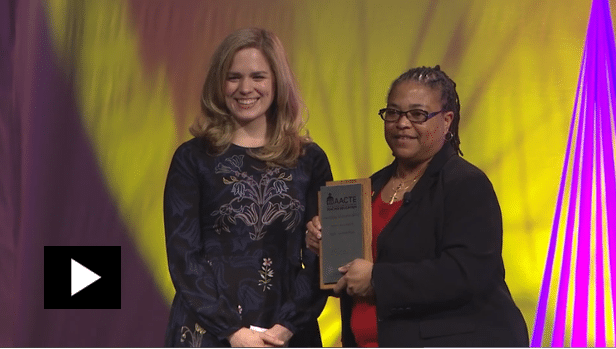
The AACTE Awards Program recognizes excellence in educator preparation in nine categories. One category is the Outstanding Dissertation Award, which honors doctoral research that contributes to the knowledge base of educator preparation or of teaching and learning with implications for educator preparation. Overseen by AACTE’s Committee on Research and Dissemination, the award includes a $1,000 cash prize as well as special recognition at AACTE’s 72nd Annual Meeting in Atlanta, GA, February 28 – March 1, 2020.
The video above features the 2018 AACTE Outstanding Dissertation Award recipient, Molly Baustien Siuty, assistant professor of inclusive teacher education at AACTE member institution
16 Aug2019
By Linda Minor

Registration is now available for the AACTE 72nd Annual Meeting, in Atlanta, Georgia, February 28 – March 1, 2020. Sign up by October 30 to secure the Early Bird registration discount!
The 2020 Annual Meeting is themed “Disrupting Inequities: Educating for Change,” conceptualized as follows in the call for proposals:
12 Aug2019
By Kimberly White Smith
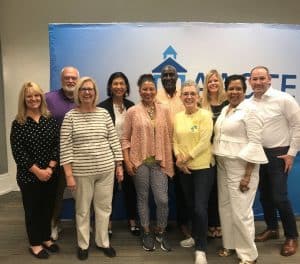
AACTE’s Committee on Meetings & Professional Development met in the national office, July 29-31, to plan the 2020 Annual Meeting. During the busy three days, members of the committee utilized feedback from AACTE’s pool of reviewers to create a rich and diverse program from submissions received through AACTE’s Call for Proposals. We asked Committee Chair Kimberly White-Smith to tell us more about the power and timeliness of the upcoming conference:
“In the wake of the murderous attacks, rooted in white supremacist ideology, against communities of color in Gilroy, El Paso, and Dayton, the theme of ‘Disrupting Inequities: Educating for Change’ is even more relevant today than a year ago when AACTE’s Meetings & Professional Development Committee first assumed the charge and created space for research and practice that promotes systemic change. Accepting the title of educator imbues each of us with a responsibility to use our knowledge, skills, minds, and hearts to walk beside the communities that we serve. It is imperative to support and uplift these communities during such tragic times.
Education is one of many tools used to transform the status quo. The 2020 Annual Meeting strands were specifically developed to explore the ways that education can be used alongside other key strategies to move the needle on equity. The intention is to demonstrate how advocacy, practice, and research can co-exist and support the movement of re-envisioning education in our country. Content presented at the Annual Meeting will further support our work in each of these areas:
09 Aug2019
By Conra Gist
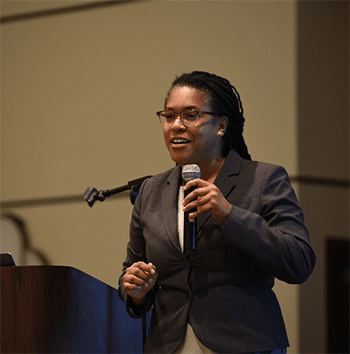
At the 2019 AACTE Annual Meeting, the third annual Diversified Teaching Workforce (DTW) Institute convened teacher educators, aspiring teachers, school leaders, and deans from across the nation to address one of the most pressing teacher education issues—diversifying the teacher workforce. Leaders of the DTW Topical Action Group (TAG), with the support of AACTE’s Member Engagement and Support team, organized the Institute. The event began with a welcome by AACTE President and CEO Lynn M. Gangone and a presentation by AACTE consultant Jane West on the state of teacher diversity in educator preparation. Marvin Lynn, College of Education dean at Portland State University, followed with opening remarks that contextualized the critical challenges facing the educator workforce as it relates toteacher diversity.
The morning plenary featured a panel facilitated by Delisa Saunders and Dyan Smiley of the American Federation of Teachers that examined
30 Jul2019
By Jerrica Thurman
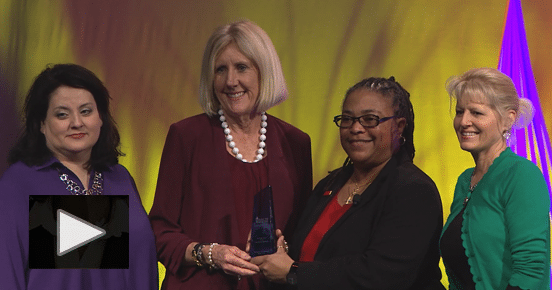
AACTE is committed to recognizing excellence in educator preparation through its prestigious annual Awards Program. Among the nine categories of awards, the Best Practice Award for the Innovative Use of Technology honors AACTE members that infuse technology throughout their curriculum in an innovative way. AACTE’s Committee on Innovation and Technology sponsors this award and selects a school, college, or department of education that uses technologies to stretch beyond standard practices in teacher education.
The video above features AACTE member institution Northeastern State University’s (NSU) College of Education, the 2018 recipient of the Best Practice Award for the Innovative Use of Technology. Dean Vanessa Anton explains how NSU’s Robotics Academy of Critical Engagement (RACE) program works and why it received the award.
20 May2019
By Lara Luetkehans

Educational technology is a critical component in the preparation of teacher candidates across the nation and the AACTE Annual Meeting is the prime opportunity to share best practices on how colleges of education are advancing technology in their programs. The AACTE 2020 Annual Meeting themed, “Disrupting Inequities: Educating for Change,” will take place February 28 – March 1 in Atlanta, GA.
The AACTE Committee on Innovation and Technology encourages proposals for the 2020 Annual Meeting in the areas of technology, innovation and teacher education. We hope you are inspired to think about how your work in the active use of technology to enable learning and teaching connects with the conferences’ four strands. We have provided recommended ways on how to feature innovation and technology in your conference proposals:
14 May2019
By Jerrica Thurman
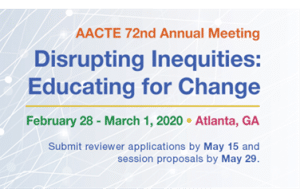 Time is running out to volunteer as a member faculty to review proposals for the AACTE 2020 Annual Meeting. Submit reviewer applications by May 15.
Time is running out to volunteer as a member faculty to review proposals for the AACTE 2020 Annual Meeting. Submit reviewer applications by May 15.
AACTE is also accepting session proposals through May 29. Below are nine reasons to participate in the call for proposals for the 72nd Annual Meeting, themed “Disrupting Inequities: Educating for Change,” to be held in Atlanta, GA, February 28 – March 1, 2020:
Why become a proposal reviewer?
19 Apr2019
By Matthew Wales
AACTE received high praise for its sessions during the 2019 Annual Meeting in Louisville, KY. Such acclaim can be contributed to one important element: the competitive nature of the Annual Meeting selection process. Each year, AACTE receives many more proposals for consideration than can be accommodated, so only the “best of the best” content makes its way into the programming for the conference.
Want to see your work featured during AACTE’s 2020 Annual Meeting in Atlanta? Then take note, because you will want to prepare a proposal that stands out in our peer-review process. Follow these five tips, and you are likely to distinguish yourself from the rest:
- Mind the Details –Y our proposal will be evaluated based upon the 10 criteria and elements outlined in the Expectations for Presentations. Familiarize yourself with these prior to writing your proposal. And most importantly, do NOT include any information that identifies either the authors or the institutions in the written proposal.
- Be Succinct and Specific – Choose a title that clearly conveys your topic. Proposals selected for presentation tend to state their subject matter upfront in the title. Additionally, the majority of chosen proposals contain short, concise abstracts that highlight the main focus of the presentation.
02 Apr2019
By Katrina Norfleet
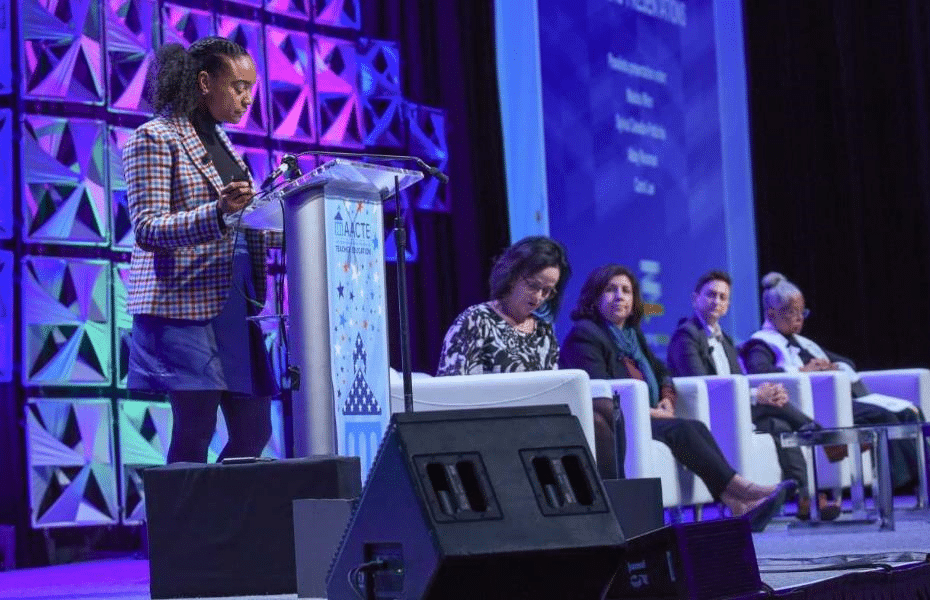
During the “Disrupting the Persistence of Oppression” Deeper Dive session, panelists explored the question: How does knowing content matter for disrupting the persistence of oppression? The panel discussion was moderated by Deborah Ball, director of TeachingWorks at the University of Michigan and included Maisha Winn, Chancellor’s Leadership Professor in the School of Education and co-director of the Transformative Justice in Education (TJE) Center at the University of California, Davis; Sylvia Celedon-Pattichis, senior associate dean for research and community engagement and professor of bilingual and mathematics education at the University of New Mexico; Abby Reisman, assistant professor of teacher education at the University of Pennsylvania; and Carol Lee, former Edwina S. Tarry Professor of Education, School of Education, of Social Policy and African-American Studies at Northwestern University.
Winn began the panel discussion with a scholarly presentation focused on restorative justice and shared a narrative framework she developed for teachers to consider when seeking justice in the school setting. The framework is based on four pedagogical stances: history matters, race matters, justice matters, and language matters. She presented the framework and shared her desire to add a fifth stance: futures matter.
02 Apr2019
By Ward Cummings
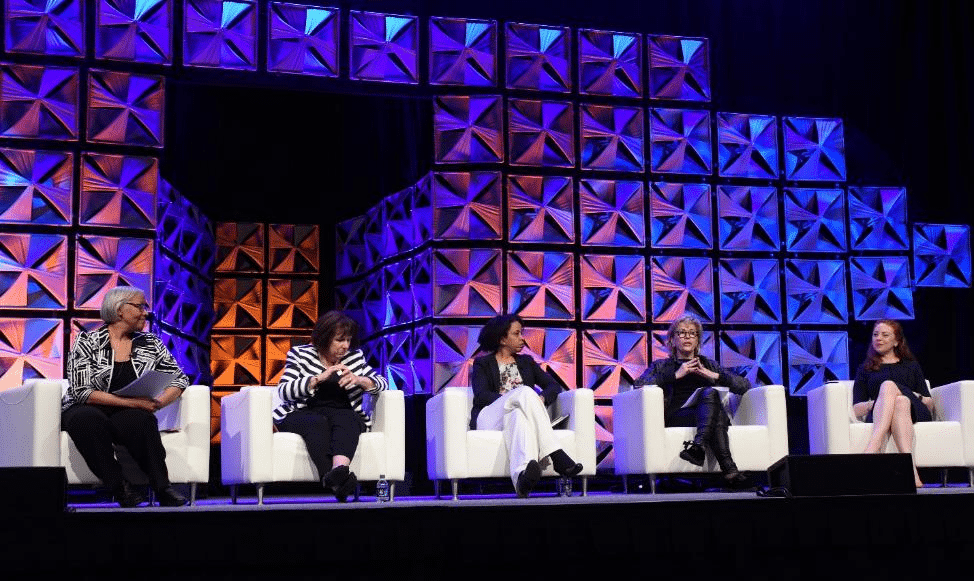
The “AACTE Initiatives toward Increasing Diversity, Equity and Inclusion in Colleges of Teacher Education” Deeper Dive session was held during the 2019 Annual Meeting. The session highlighted the association’s current, ongoing, and future commitments in these areas in a discussion moderated by Jennifer Robinson of Montclair State University and included panelists Lillian Sharon Leathers of William Paterson University of New Jersey and AACTE’s Jacqueline King, Jacqueline Rodriguez, and Jane West.
King, author of AACTE’s recently published Education Students and Diversity: A Review of New Evidence report, described the findings, which showed that education is the least diverse in bachelor’s degree fields. King shared other important data such as 50% of African American education students and 40% of Hispanic education students are independent; 30% of African American students and 20% Hispanic students had children; and 20% African American students were single parents. She emphasized that child care, for example, is an issue that cannot be ignored when considering the matter of diversity. In addition, 4% of Hispanic students are first generation students and 22% do not have a parent that has graduated from high school. The study revealed that one in five African American students work full-time and that the median family income of white, dependent students is more than double of their African American and Hispanic peers.
02 Apr2019
By Jerrica Thurman
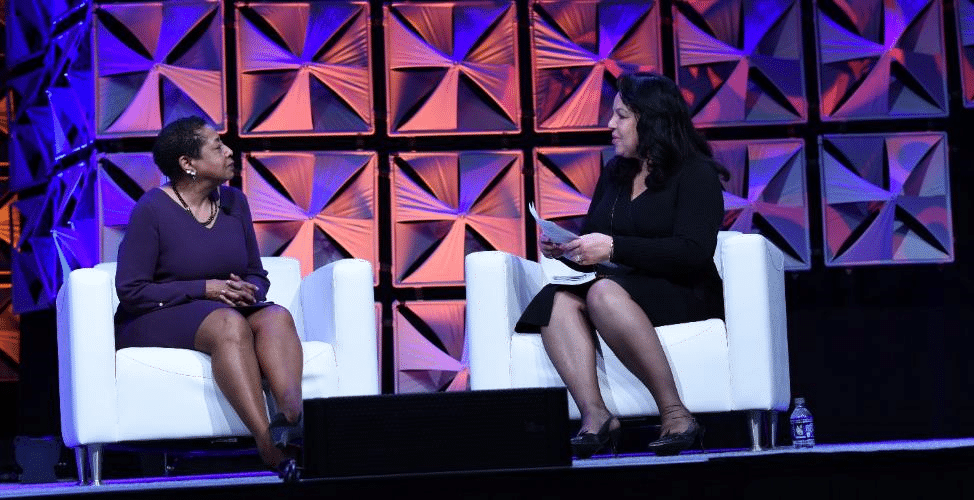
Annual Meeting Closing keynote speakers Mary Dilworth, editor of Millennial Teachers of Color, and Leslie Fenwick, dean emerita of Howard University, presented the topic, “Millennial Teachers of Color: Follow Their Lead, They Know Where We Need To Be,” on Sunday, February 24. During the session, the educators explored millennial teachers through a new lens by examining the intersection of race ethnicity and generation.
Dilworth has centered her career on teacher quality and preparation, with a keen focus on racial/ethnic and linguistic diversity and equity issues. Recently, she was a co-principal investigator for the National Science Foundation (NSF-DR12) project designed to recruit, prepare, license, and employ middle and high school science teachers from underrepresented groups. In addition, she served as a visiting professor and director of the Center for Urban Education at the University of the District of Columbia. Earlier in her career, she was a research fellow with Howard University’s Institute for the Study of Educational Policy (ISEP) and became widely recognized for heightening the national discourse on the disparate impact of licensing tests on underrepresented groups.
02 Apr2019
By Katrina Norfleet
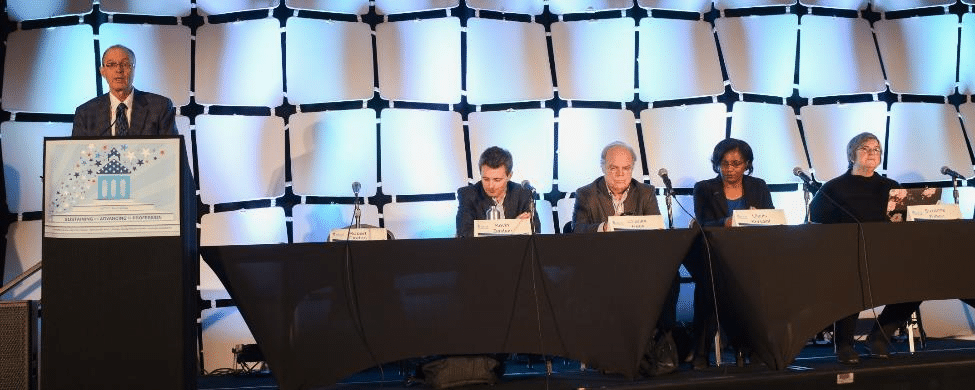
The “Data Systems” Deeper Dive session, held during the AACTE 2019 Annual Meeting examined the possibilities and challenges for using information and evidence-based research to improve teacher education programs. The discussion was led by moderator Robert Floden, dean of the College of Education at Michigan State University, and included four panelists: Kevin Bastian, senior research associate, University of North Carolina (UNC) and director, Teacher Quality Research Initiative Education Policy Initiative at Carolina (EPIC); Charles Peck, a professor of teacher education and special education at the University of Washington; Suzanne Wilson, Neag School of Educatin Endowed Professor of Teacher Education at the University of Connecticut (UConn); and Gladis Kersaint, dean, Neag School of Education at UConn.
The robust discussion opened with Bastian sharing the details of a two-pronged study conducted by EPIC that pairs student teaching data with workforce outcomes. He stated, “The problem we’re interested in addressing is how can programs take a mountain of performance assessment data and identify what we might call actionable evidence within it.”
02 Apr2019
By Ward Cummings
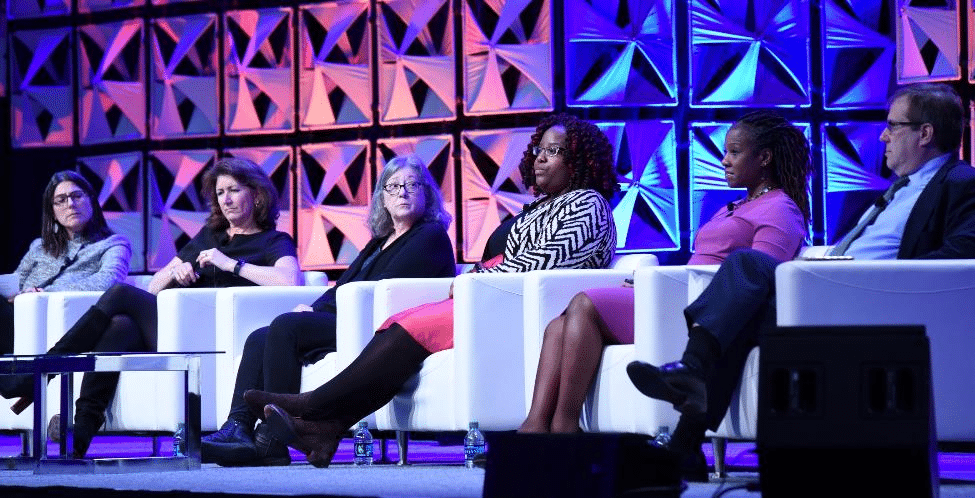
The Deeper Dive session, “Too Expensive to Ignore,” held during the AACTE 2019 Annual Meeting explored the many creative ways educators are working to address the high costs associated with becoming a teacher. The panel discussion was moderated by Karen DeMoss, executive director of Prepared to Teach, Bank Street College of Education, and the presenters were Tara Kini, director of state policy at the Learning Policy Institute (LPI); Karen Riley, dean of the College of Education at the University of Denver; Karen Kindle, division chair, Teacher Residency and Education at the University of South Dakota (USD); Jeannie Aversa, coordinator of educator effectiveness at the Syracuse City School District; and Nichole Brown, director of field placement and project director, Teacher Opportunity Corp II at SUNY Oswego. The group of educators engaged in a lively conversation about how to create sustainable funding for teacher residencies.
DeMoss began the discussion with an overview of the reasons solutions to the funding problem are necessary. She shared that attracting diverse candidates to the teaching profession requires a focus on the money matters that teaching candidates care about. For example, 40% of undergraduates and 76% of graduate students work full time, and they incur debt that is often untenable in comparison to the salaries they can expect as teachers.
01 Apr2019
By Deondra Gladney and Stephanie Jones-Fosu
The AACTE Holmes Scholars Program recently welcomed two new members: University of North Carolina at Charlotte (UNCC) doctoral students Stephanie Jones-Fosu and Deondra Gladney. The two Scholars share their experience as first-time AACTE Annual Meeting and Holmes Preconference attendees.
Stephanie’s Reflection
The Holmes Scholar Program is designed to provide equitable opportunities to emerging scholars from underserved populations. By having the distinct opportunity to be one of first Holmes Scholars from UNCC, an entire level of educational greatness has been literally dropped in my lap. During the 2019 AACTE Annual Meeting in Louisville KY, the Holmes Program created an exclusive preconference event where Holmes students at various levels of education came together to learn and grow from Scholars around the country.
29 Mar2019
By Reena Patel-Viswanath
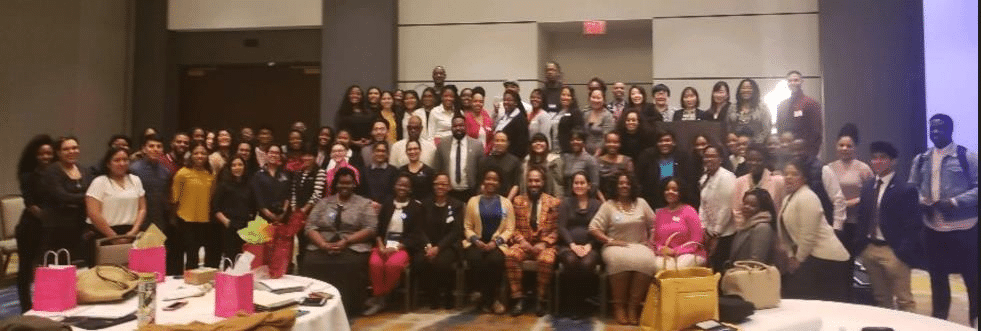
The 71st AACTE Annual Meeting was held in Louisville Kentucky from February 22-24, 2019. The AACTE theme this year was “Sustaining and Advancing the Profession.” The attendance was impressive, surpassing the number of attendees from previous years. The meeting allowed the members and alumni of the AACTE Holmes Program to escape daily routines, work distractions, and be fully present during a vibrant and innovative experience. This special environment fostered rich dialogue, sharing of research ideas, and collaboration on finding solutions to complex problems.
Interactive Sessions, Dynamic Conversations, Innovative Solutions, and Tangible Outcomes
The AACTE Holmes preconference agenda centered around growth—both professionally and personally. While lecture-style sessions are beneficial, this year the strategic planning team implemented more interactive sessions. For example, during the Career Choice Pathway sessions, the audience was intentionally involved and invited to participate in dialogue. This year also consisted of tangible outcomes such as productive writing skills. A session was dedicated for focus based-research writing, which allowed for experimentation of a new writing tool to aid in efficient writing. Students were able to share and connect over similar writing experiences and provide guidance on how to stay motivated. Lastly, this year we were honored to have alumni host sessions, provide their mentorship, and invite collaboration on projects.













 Time is running out to volunteer as a member faculty to review proposals for the
Time is running out to volunteer as a member faculty to review proposals for the 




